牛津译林版六年级上册全册知识点整理 八个单元
译林版 六年级上册 知识点梳理
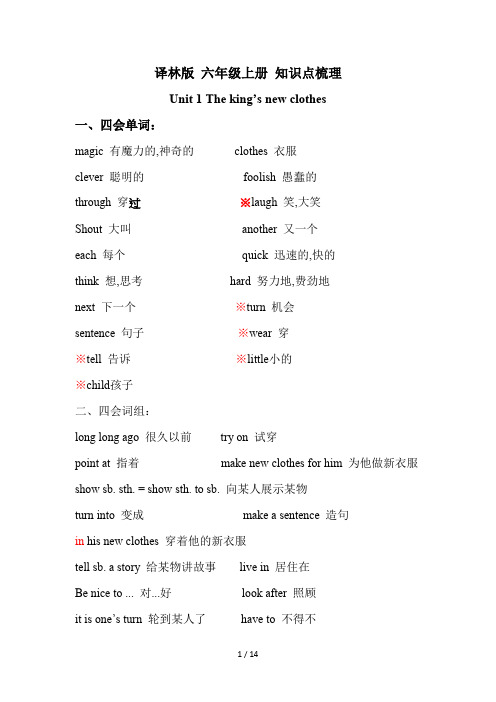
译林版六年级上册知识点梳理Unit 1 The king’s new clothes一、四会单词:magic 有魔力的,神奇的clothes 衣服clever 聪明的foolish 愚蠢的through 穿过※laugh 笑,大笑Shout 大叫another 又一个each 每个quick 迅速的,快的think 想,思考hard 努力地,费劲地next 下一个※turn 机会sentence 句子※wear 穿※tell 告诉※little小的※child孩子二、四会词组:long long ago 很久以前try on 试穿point at 指着make new clothes for him 为他做新衣服show sb. sth. = show sth. to sb. 向某人展示某物turn into 变成make a sentence 造句in his new clothes 穿着他的新衣服tell sb. a story 给某物讲故事live in 居住在Be nice to ... 对...好look after 照顾it is one’s turn 轮到某人了have to 不得不in front of 在...前面walk by 路过think hard 努力地思考shout at sb. 对某人大喊三.重点句型:1.Long long ago, there was a king. 很久很久以前,有一个国王。
2.Two men visited the king. 两个男人来拜访国王。
3.We can make new clothes for you. 我们可以为你做新衣服。
4.The two men showed the king his new clothes. 这两个人向国王展示了他的新衣服。
5.The king walked through the city in his new clothes. 国王穿着他的新衣服步行穿过城市。
译林英语六年级上册全册重难点知识点梳理
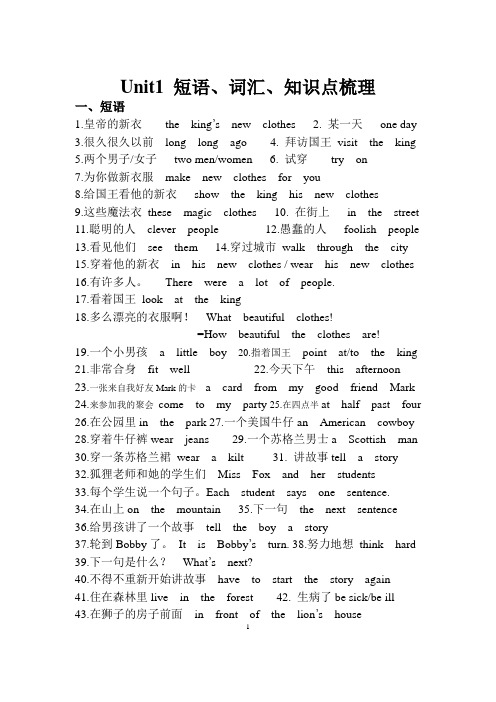
Unit1 短语、词汇、知识点梳理一、短语1.皇帝的新衣the king’s new clothes2. 某一天one day3.很久很久以前long long ago4. 拜访国王visit the king5.两个男子/女子two men/women6. 试穿try on7.为你做新衣服make new clothes for you8.给国王看他的新衣show the king his new clothes9.这些魔法衣these magic clothes 10. 在街上in the street 11.聪明的人clever people 12.愚蠢的人foolish people 13.看见他们see them 14.穿过城市walk through the city15.穿着他的新衣in his new clothes / wear his new clothes16.有许多人。
There were a lot of people.17.看着国王look at the king18.多么漂亮的衣服啊!What beautiful clothes!=How beautiful the clothes are!19.一个小男孩 a little boy 20.指着国王point at/to the king 21.非常合身fit well 22.今天下午this afternoon23.一张来自我好友Mark的卡 a card from my good friend Mark24.来参加我的聚会come to my party 25.在四点半at half past four 26.在公园里in the park 27.一个美国牛仔an American cowboy 28.穿着牛仔裤wear jeans 29.一个苏格兰男士a Scottish man 30.穿一条苏格兰裙wear a kilt 31. 讲故事tell a story32.狐狸老师和她的学生们Miss Fox and her students33.每个学生说一个句子。
江苏译林(牛津)版英语六年级上册知识点整理
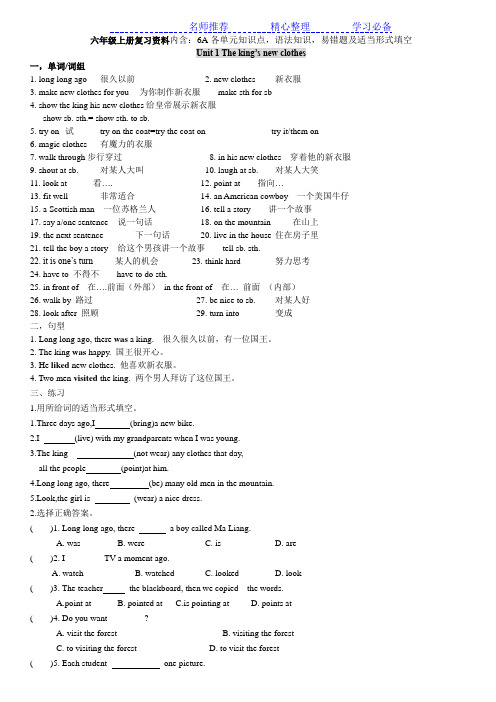
六年级上册复习资料内含:6A各单元知识点,语法知识,易错题及适当形式填空Unit 1 The king’s new clothes一,单词/词组1. long long ago 很久以前2. new clothes 新衣服3. make new clothes for you 为你制作新衣服make sth for sb4. show the king his new clothes给皇帝展示新衣服show sb. sth.= show sth. to sb.5. try on 试try on the coat=try the coat on try it/them on6. magic clothes 有魔力的衣服7. walk through步行穿过8. in his new clothes 穿着他的新衣服9. shout at sb. 对某人大叫10. laugh at sb. 对某人大笑11. look at 看….12. point at 指向…13. fit well 非常适合14. an American cowboy 一个美国牛仔15. a Scottish man 一位苏格兰人16. tell a story 讲一个故事17. say a/one sentence 说一句话18. on the mountain 在山上19. the next sentence 下一句话20. live in the house 住在房子里21. tell the boy a story 给这个男孩讲一个故事tell sb. sth.22. it is one‟s turn 某人的机会23. think hard 努力思考24. have to 不得不have to do sth.25. in front of 在….前面(外部)in the front of 在… 前面(内部)26. walk by 路过27. be nice to sb. 对某人好28. look after 照顾29. turn into 变成二,句型1. Long long ago, there was a king. 很久很久以前,有一位国王。
译林版英语六年级上册复习知识点全汇总
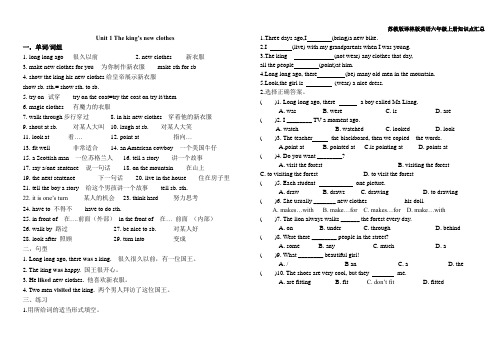
苏教版译林版英语六年级上册知识点汇总Unit 1 The king’s new clothes一,单词/词组1. long long ago 很久以前2. new clothes 新衣服3. make new clothes for you 为你制作新衣服make sth for sb4. show the king his new clothes给皇帝展示新衣服show sb. sth.= show sth. to sb.5.try on 试穿try on the coat=try the coat on try it/them6. magic clothes 有魔力的衣服7. walk through步行穿过8. in his new clothes 穿着他的新衣服9. shout at sb. 对某人大叫10. laugh at sb. 对某人大笑11. look at 看….12. point at 指向…13. fit well 非常适合14. an American cowboy 一个美国牛仔15. a Scottish man 一位苏格兰人16. tell a story 讲一个故事17. say a/one sentence 说一句话18. on the mountain 在山上19. the next sentence 下一句话20. live in the house 住在房子里21. tell the boy a story 给这个男孩讲一个故事tell sb. sth.22. it is one’s turn 某人的机会23. think hard 努力思考24. have to 不得不have to do sth.25. in front of 在….前面(外部)in the front of 在… 前面(内部)26. walk by 路过27. be nice to sb. 对某人好28. look after 照顾29. turn into 变成二,句型1. Long long ago, there was a king. 很久很久以前,有一位国王。
最新牛津译林版六年级上册单词词汇表汇总(完整打印版)

牛津译林版六年级上册单词表Unit 1 The king's new clothes long long ago很久以前magic有魔力的,神奇的clever聪明的foolish愚蠢的through穿过laugh笑,大笑wear穿turn into变成sentence句子each每个quick迅速的,快的think想,思考another又一个next下一个turn机会hard努力地,费劲地Unit 2 What a day!sunny晴朗的show展览,展示interesting有趣的,有意思的weather天气become变成,变为windy有风的cloudy多云的high在高处honey蜂蜜drink饮料ant蚂蚁bee蜜蜂cloud云rain下雨meet遇见lose丢失know知道What happened?出什么事了? climb up爬上hold onto抓紧fly away飞走Unit 3 Holiday funholiday假日,假期National Day国庆节call打电话Bund(上海)外滩Shanghai Museum上海博物馆Great Wall长城Palace Museum故宫Summer Palace颐和园Tian'anmen Square 天安门广场fashion show时装表演,时装秀bottle瓶子go well进展顺利first开始,最初heavy rain大雨Unit 4 Then and nowthen and now过去和现在ago……以前telephone电话office办公室mobile phone移动电话,手机anywhere随处,到处radio收音机newspaper报纸news新闻e-book电子书make friends交朋友all over the world全世界shopping购物TV电视look out of朝……外看What day is today ?今天是星期几? go on继续spell拼读,拼写make a sentence造句with用yesterday昨天Unit 5 Signssign标识shopping centre购物中心careful小心,当心What does it mean?这是什么意思?mean意思是litter乱扔垃圾go in进入,走进take携带restaurant饭店,餐厅smoke吸烟,抽烟someone某人smell闻到No eating or drinking .请勿饮食No littering .请勿乱扔垃圾No parking .请勿停车No smoking .请勿吸烟Danger!危险!Wet floor .小心地滑outing外出游玩,远足walk on继续走路around在……周围Unit 6 Keep our city clean keep保持,维持clean干净的,整洁的make使……变得photo照片air空气dirty肮脏的smoke烟雾rubbish垃圾messy肮脏的,乱七八糟的dead死的move...away from从……搬走bin垃圾桶plant种植,栽种more更多的museum博物馆cinema电影院throw扔skin果皮pick...up捡起,拾起slip滑倒fall摔倒Unit 7 Protect the Earth protect保护Earth地球save节约useful有用的use使用,利用waste浪费much很多reuse再利用energy能源come from从……来,来自coal煤炭oil石油drive开车;驾驶wood木头,木材cut down砍伐,砍掉too many太多plastic塑料paper纸glass玻璃project课题poster海报gate大门Unit 8 Chinese New YearHong Kong香港excited激动的,兴奋的food食物,食品tangyuan汤圆Chinese New Year's Eve 大年夜,除夕Chinese New Year's Day 大年初一,春节red packet红包lion dance舞狮fireworks烟花表演firecracker鞭炮rich富有的,有钱的plan计划,打算hooray好极了。
苏教版六年级英语上册(译林牛津6A)知识点总结
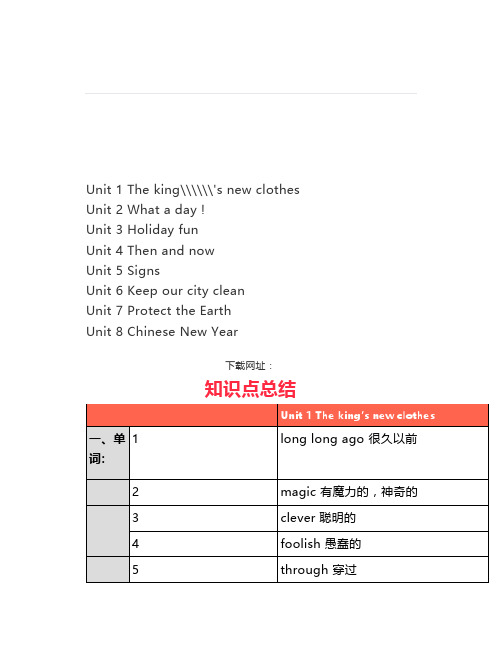
6. magic clothes 有魔力的衣服
7. walk through步行穿过
8. in his new clothes 穿着他的新衣服
9. shout at sb. 对某人大叫
10. laugh at sb. 对某人大笑
11. look at 看….
12. point at 指向…
13
paper 纸
14
ask 问
15
bottle 瓶子
16
go well 进展顺利
17
at first 开始,最初
18
heavy rain 大雨
二、词组
1. come back to school 返校
2. the National Day holiday 国庆节假期
3. call you 打电话给你
weather 天气
5
become 变成,变为
6
windy 有风的
7
cloudy 多云的
8
high 在高处
9
sky 天空
10
bring 带来
11
honey drink蜂蜜饮料
12
ant 蚂蚁
13
bee 蜜蜂
14
cloud 云
15
rain 下雨
16
rainy 多雨的
17
lose 丢失
18
know 知道
9. fly kites high in the sky风筝放得高
10. bring some dumplings带来一些饺子
11. bring lunch 带午餐
12. some bread and honey 一些面包和蜂蜜
【新】译林版六年级上册英语 第1-8单元全册重点知识点归纳总结

六上Unit1单元知识一、词组1皇帝的新衣the king’s new clothes2很久以前long long ago3某一天one day4两个男子two men5拜访国王visit the king6为你做新衣服make new clothes for you7给国王看他的新衣show the king his new clothes8试穿try on9这些魔法衣服these magic clothes10聪明的人clever people11愚蠢的人foolish people12穿着他的新衣in his new clotheswear his new clothes13许多人a lot of people14在街上in the street15看着国王look at the king16一个小男孩a little boy17指着国王point at the king18嘲笑他laugh at him19非常合身fit well20穿着黄色毛衣wear yellow sweater21在四点半at half past four22穿着牛仔裤wear jeans23讲故事tell a story24每个学生each student25下一句the next sentence26轮到波比了。
It is Bobby’s turn.27努力地想think hard28下一句是什么?What’s next?29不得不重新开始讲故事have to start the story again30在狮子的房子前面in front of the lion’s house31在房子旁边散步walk by the house32对着老人大喊shout at the old man33把你的孩子给我give me your childgive your child to me34和狮子住在一起live with the lion35对她很好be nice to her36照顾他look after him37快点be quick38穿过城市walk through the city39在山上on the mountain40住在森林里live in the forest41愤怒的狮子the angry lion42生病了be sick/be ill43变成一个王子turn into a prince△44一个苏格兰男士a Scottish man△45穿一条苏格兰裙wear a kilt△46一个美国牛仔an American cowboy47What beautiful clothes!多漂亮的衣服!48make the clothes for me为我做衣服49come to my party来参加我的聚会50pick a flower摘一朵花51the old man’s child老人的孩子52say one sentence说一个句子二、句型1.Long long ago,there was a king.很久以前,有以为国王。
译林版小学英语六年级上册单元知识点6AUnit1-unit8
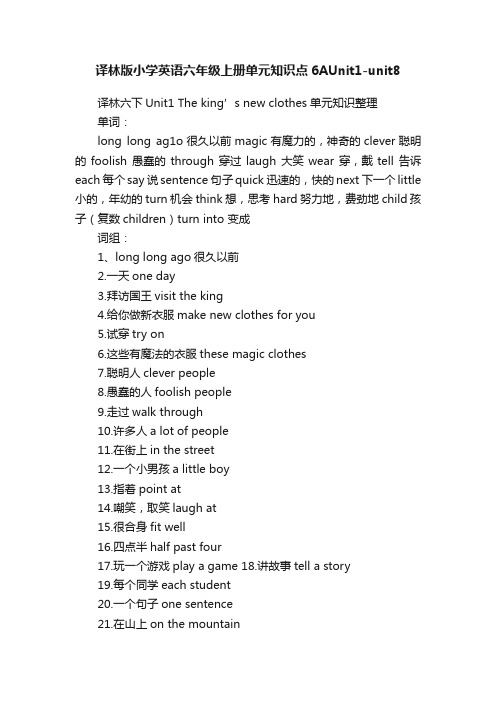
译林版小学英语六年级上册单元知识点6AUnit1-unit8译林六下Unit1 The king’s new clothes单元知识整理单词:long long ag1o很久以前magic有魔力的,神奇的clever聪明的foolish 愚蠢的through 穿过laugh 大笑wear 穿,戴tell 告诉each 每个say 说sentence 句子quick 迅速的,快的next 下一个little 小的,年幼的turn 机会think 想,思考hard 努力地,费劲地child 孩子(复数children)turn into 变成词组:1、long long ago很久以前2.一天one day3.拜访国王visit the king4.给你做新衣服make new clothes for you5.试穿try on6.这些有魔法的衣服these magic clothes7.聪明人clever people8.愚蠢的人foolish people9.走过walk through10.许多人a lot of people11.在街上in the street12.一个小男孩a little boy13.指着point at14.嘲笑,取笑laugh at15.很合身fit well16.四点半half past four17.玩一个游戏play a game 18.讲故事tell a story19.每个同学each student20.一个句子one sentence21.在山上on the mountain22.下一个句子next sentence23.认真思考think hard24.不得不have to25.开始讲故事start the story26.在森林里in the forest27.在......前面in front of28.路过walk by29.摘花pick a flower(pick flowers )30.朝着......大喊shout at31.对......很好be nice to somebody32.照看,照顾look after33.变成turn into34.understand the story明白这个故事句子:1、long long ago, there was a king.很久很久以前有一个国王。
- 1、下载文档前请自行甄别文档内容的完整性,平台不提供额外的编辑、内容补充、找答案等附加服务。
- 2、"仅部分预览"的文档,不可在线预览部分如存在完整性等问题,可反馈申请退款(可完整预览的文档不适用该条件!)。
- 3、如文档侵犯您的权益,请联系客服反馈,我们会尽快为您处理(人工客服工作时间:9:00-18:30)。
6A Unit1 The king’s new clothes知识点梳理重点单词long long ago很久以前magic有魔力的,神奇的clever聪明的foolish 愚蠢的through 穿过laugh 大笑wear 穿,戴tell 告诉each 每个say 说sentence 句子quick 迅速的,快的next 下一个little 小的,年幼的turn 机会think 想,思考hard 努力地,费劲地child 孩子(复数children)turn into 变成重点短语1.the king’s new clothes 皇帝的新装2.long long ago 很久以前3.like new clothes喜欢新衣服4.one day 一天5.man----men 男人(复数)6.visit the king 拜访国王7.make new clothes for you 为你做新衣服8.make…for…为某人做……9.show the king his new clothes=show his new clothes to the king展示给国王看他的新衣服10.try on…试穿……11.try on these magic clothes 试穿这些神奇的衣服12.magic clothes 神奇的衣服13.clever people 聪明的人14.foolish people 愚蠢的人15.clever聪明的(反义词)foolish愚蠢的16.walk through the city (步行穿过)走过城市17.in his new clothes 穿着他的新衣服18.a lot of people 许多人19.in the street 在大街上20.look at the king and shout 看着国王大叫21.What beautiful clothes!=How beautiful the clothes are!多么漂亮的衣服啊!22.a little boy 一个小男孩23.point at 指向ugh笑(反义词)cry 哭ugh at…嘲笑……26.wear穿(近义词组)put on (同音词)where27.is\am(过去式)was28.are(过去式)were29.like喜欢(过去式)liked/t/30.walk步行(过去式)walked/t/31.look看(过去式)looked/t/ugh笑(过去式)laughed/t/33.pick摘(过去式)picked/t/34.visit拜访(过去式)visited/id/35.Shout大喊(过去式)shouted/id/36.point指向(过去式)pointed/id/37.show展示(过去式)showed/d/38.live居住(过去式)lived/d/39.turn转(过去式)turned/d/40.this afternoon 今天下午41.get收到,得到(过去式)got42.say说(过去式)said(三单)sayse to my party 来参加我的聚会44.at half past four在四点半45.an American cowboy 一位美国牛仔46.wear jeans穿牛仔裤47.a Scottish man一位苏格兰男人48.wear a kilt穿一件苏格兰短裙49.tell a story 讲故事50.story故事(复数)stories51.each student 每一个学生52.say one sentence说一个句子53.start开始(三单)starts(过去式)started(同义词)begin54.quick快的(副词)quickly快地55.a mountain 一座山56.on the mountain在山上57.the next sentence 下一句58.an old man 一位老爷爷59.great(同义词)wonderful太棒了60.tell 讲,叙述(过去式)told61.tell the boy a story 给男孩讲一个故事62.Bobby’s turn 鲍比的机会63.think hard 努力思考64.have to do sth 不得不做某事65.have to start the story again不得不重新开始这个故事66.live in a forest 住在森林里67.in front of...在……前面68.in front of the lion’s house 在狮子的房子前面70.pick a flower 摘一朵花71.be angry 生气72.shout at the old man 对着老人大喊73.give me your child =give your child to me给我你的孩子74.child孩子(复数)children75.a beautiful girl 一位漂亮的女孩77.be nice to her /him/me…对她\他\我……很好78.be sick/ill 生病79.look after 照看照顾80.look after him/her照顾他/她81.turn into 变成82.turn into a prince变成一位王子重点句子1、Long long ago, there was a king.很久很久以前有一个国王。
2、There were a lot of people in the street.有许多人在街上。
3、One day, two men visited the king.一天,两个人拜访了国王。
4、The king was happy.国王很开心。
5、The king liked new clothes.国王喜欢新衣服。
6、Please try on these magic clothes.请试穿这些新衣服。
7、Clever people can see them.聪明人能看见它们。
8、Foolish people can’t see them.愚蠢的人看不见它们。
9、The king walked through the city in his new clothes.国王穿着他的新衣服穿过城市。
10、They looked at the king and shouted.他们看着国王并且大喊。
11、What beautiful clothes !多漂亮的衣服啊!12、A little boy pointed at the king and laughed.一个小男孩指着国王并且大笑。
13、The king isn’t wearing any clothes !国王什么衣服也没穿。
14、Do they fit?他们合身吗?They fit well.他们很合身。
15、They are telling a story.他们正在讲故事。
16、Each student says one sentence.每个学生说一个句子。
17、It’s Bobby’s turn.该轮到鲍比了。
18、He is thinking hard. 他在认真思考。
19、The old man told the boy a story.那个老人给小男孩讲了一个故事。
重点语法:牢记四个四,学好过去时一般过去时表示在过去某个时间发生的动作或存在的状态,常与表示过去的时间短语连用。
其谓语动词用过去式来表达。
请记好我帮你总结的四个四,相信你能够了解并能熟练地运用了。
四种用法①表示在过去某个时间发生的动作或情况。
例如:I went to school at 7:00 yesterday morning.我昨天早晨七点去上学。
②表示在过去某个时间存在的状态。
例如:She was not at home last night.她昨晚八点没在家。
③表示在过去经常或反复发生的动作,常和often(经常)、always(总是)、sometimes (有时)等表示频率的时间状语连用。
例如:He often had lunch at school last month.他上个月经常在学校吃午饭。
④表示已故的人所做的事情或情况。
例如:Ba Jin wrote a lot of novels for us.巴金写了很多部小说。
四种时间状语① yesterday及相关短语。
例如:yesterday morning/afternoon/evening 昨天上午/下午/晚上。
②“last+ 时间状语”构成的短语。
例如:last night/month/spring/year 昨晚/上个月/去年春天/去年。
③“一段时间+ago”组成的短语。
例如:three days ago 三天以前 four years ago四年以前。
④“介词+ 时间名词”组成的短语。
例如:in 1999 在1999年;on the morning of December 25th 在12月25号早上。
四种谓语动词的表现形式① be动词的过去式was、were.例如:She was a teacher five years ago. 她五年前是一名教师。
②行为动词的过去式,分为规则动词和不规则动词两种。
规则动词的过去式的构成遵循以下四个规则:1)be动词的过去式:am / is→was, are→were2)行为动词过去式的“规则”变化:①一般动词,在词尾直接加ed,如:look→looked, work→worked②以不发音的e结尾的动词,直接加d,如:like→liked, live→lived③以辅音字母+y结尾的动词,变y为i,再加ed,如:study→studied, cry→cried④双写末尾字母,再加ed,如:stop→stopped, plan(计划)→planned, shop →shopped而不规则动词的过去式则需认真下工夫去记了,例如:go-went; come-came; buy-bought等。
③连系动词的过去式。
例如:become(变得,变成)-became She became angry. 她生气了。
④情态动词的过去式+动词原形。
例如:I could swim at the age of five. 我五岁时就会游泳了。
四种句式的构成①一般过去时态的肯定句式“主语+动词过去式+其它”例如:Jenny bought a skirt yesterday. 詹妮昨天买了一件短裙。
②一般过去时态的否定句式“主语+didn’t+动词原形+其它”例如:Jenny didn’t buy a skirt yesterday. 詹妮昨天没有买短裙。
